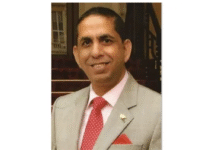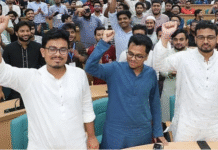
Syed Badrul Ahsan
A new phase in history was inaugurated through the tragedy of February 21, 1952.
In one of those rare moments in time when a people rise, to demand that they be allowed to speak, read and write in the language of their ancestors, that no one tamper with that right, several young Bangalees sacrificed their lives in defence of national self-esteem.
These men, and all those other men who had put up resistance against the efforts of the Pakistani state to undermine their cultural ethos, called forth the courage to defy the state because the state had lost touch with reason.
When these Bangalees died 61 years ago today, they sent out the clear message to the living that their heritage would live on, that the state which was putting the life out of them was shooting itself in the foot.
Today, as we observe the martyrdom of those defenders of the Bangla language, we recall too that Ekushey 1952 was that defining moment in our collective life when we sounded the warning that geography structured into political absurdity by misleading communal politics could certainly not override the cultural legacy of its Bangla-speaking people. That culture was greater than fanaticism, that heritage existed on a much higher plane than the politics of the effete and the snobbish, was the truth we sent out on this day in 1952. That truth was to expand, widen, fill itself with increasing doses of political and aesthetic richness and lead us on to paths of greater glory.
Ekushey led in time to a resurgence of Rabindranath’s songs, in 1961. It impelled our students, in 1962, into a rejection of the education report of the Ayub Khan junta.
Because of Ekushey, we put up barricades of resistance to those who would instigate communal riots in East Bengal in 1964. Because of the sacrifices of 1952, our leadership told the entrenched communal-civil-military establishment based in Rawalpindi, in 1966, that the state called for a major rehaul to survive or, failing that, to be ejected from our land altogether. We sent Pakistan’s first dictator packing in 1969.
Nearly three years later, we humiliated the second dictator and his murderous army, along with their local henchmen in East Bengal, into a surrender that would shame them forever. It was Ekushey that was our strength, the belief which informed us that ours being a cultural, language-based nationalism, we simply had no wish to inhabit a ghetto constructed of religious hate and anti-historical falsehood.
This morning, Ekushey warns us to be on our guard against those who murdered in 1971 and whose fanatical, bloodthirsty descendants might murder in the old fashion. On Ekushey, we link up with our brave men — our students, our founding fathers, our Mukti Bahini soldiers, indeed the souls of our three million murdered compatriots — to remind ourselves that those who have killed and raped must walk to their richly deserved punishment.
And those who, in near-madness, go about defending these war criminals, through commandeering Islam and thereby sullying its reputation, through attempting to question the religiosity of the Bangalee nation as it converges at Projonmo Chottor must be swatted down in the interest of our survival. These dark forces of hate will not defeat us. But it must also be our endeavour from now on to put to a decisive end their nefarious attempts to nibble away at our national ethos.
Ekushey 1952 was a call to every Bangalee to put the denizens of mediaeval darkness to flight. Let Ekushey 2013 ensure that never again will these sinister men, the ageing war criminals and their equally sinister philistine followers, arise to impede our march to a future of light and laughter and happiness.
Source: The Daily Star









